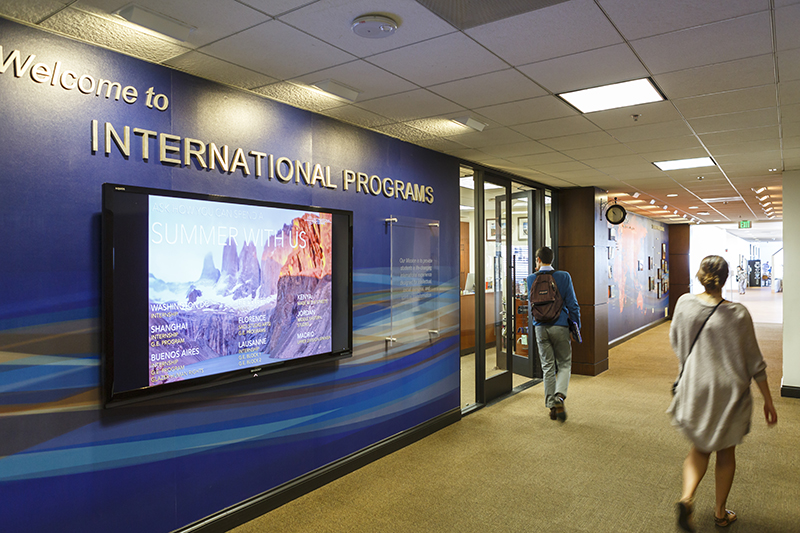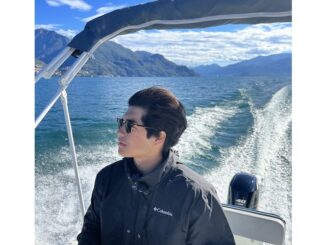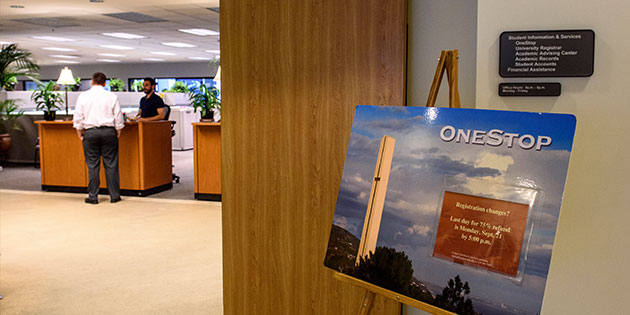
London? Lausanne? Buenos Aires?
It’s a game of roulette to guess which Pepperdine international program will fill up first, as the popularity of a program shifts from one year to the next.
While all seven programs fill up every year, some fill up faster by the priority deadline, creating waiting lists or bumping students to second-choice programs. A spring 2014 survey of 50 students listed Lausanne, Switzerland, London, United Kingdom and Buenos Aires, Argentina as the most consistently popular programs and the majority of students said they enrolled in their program based on this perceived popularity.
“It’s funny for me to see which are the most competitive (programs) between years,” said Jeff Hamilton, International Programs director of Administration and Student Affairs. “It goes all over the board.”
Language, culture and word-of-mouth dominate student decision making, making it difficult to predict the appeal of a program from year to year.
“There’s no real way to say which program will be the most popular,” Hamilton said. “Because every year it changes, London and Heidelberg were the most full by this year’s priority deadline, but there is no way to predict which will be the most full next year.”
The Institute of International Education ranks Pepperdine University as No. 2 in the nation for percentage of students who study abroad.
Some 60 percent of students attend an International Program and 15 percent of those students return for a second or third excursion abroad. Each year there is a different program that fills up quickly by the priority deadline, fall semester the year before students go abroad, while other programs continue accepting applications year round. This has led the IP office to begin brainstorming possible new locations for their international programs to meet demand.
Current year-round locations include Washington D.C. as the only domestic program and Lausanne, London, Buenos Aires, Florence, Italy, Heidelberg, Germany, and Shanghai, China abroad. The IP office also offers summer destinations such as Fiji, Spain, Scotland, East Africa and Kenya. Internship opportunities are also available at most of these locations for students.
“Each program is so incredible for different reasons,” Hamilton said. “I’m just waiting to see if people will pick up on those different reasons.”
Hamilton said word-of-mouth was the most effective recruiting strategy. Some programs have an advantage by having more alumni than others. While the Buenos Aires program can house 82 students, the D.C. program may only have 30 students, allowing Buenos Aires alumnus to spread more buzz.
The spring 2014 survey showed that word-of-mouth was instrumental for many students. Some 30 percent of students cited inspiration from others as the deciding factor in choosing a location.
“I have had plenty of major influences with students that went abroad to Lausanne,” said freshman Salim Collins, an international studies major. “Some of my closest friends are Lausanne alumni.”
Personal stories seem to be the most effective tool in describing an experience at a certain location and encouraging students to travel abroad in general.
One third of students surveyed said the IP office’s event, “The Return,” where program alumni converse with freshmen before IP applications are due, inspired them to apply to go abroad.
“Those kinds of stories and narratives make a location become real to you,” Hamilton said. “Students look to those stories to find a marriage of comfort and adventure, then they will ask themselves ‘where is there more potential for adventure for me?’”
Roughly 25 percent of students said culture and language influenced them in choosing which location to travel to specifically.
World events, such as the Olympics and World Cup are also an instigator for study abroad opportunities, though not a strong factor.
Location is another factor for some students. Dave Stevens, a junior and economics major, chose Lausanne specifically for its centrality in Europe.
“What I really liked about being in one of the European programs was that I was centrally located,” Stevens said. “I wanted to travel and I needed a good place to start. I also wanted a similar but different language.”
Possible future destinations for the IP program include a cruise ship, which would transport students from port to port, allowing students to visit several countries throughout their semester. This would give the university the flexibility needed to introduce its students to the world while still developing a strong sense of faith in the students. Students have also requested Australia, New Zealand, South Africa and Mexico.
“It’s one of the most enjoyable games — to try and speculate,” Hamilton said. “We always like to think and dream where the next location is going to be, to think toward innovation and growth.”
The IP office has used summer programs to launch year-long ventures. Buenos Aires for example, began solely as a summer program, but its constant success made it the year-round program it is today.
“It was a homestay out of necessity at first,” Hamilton said. “Then we realized the viability and desire for that from our students, so that’s how we modeled it, based on what we saw our students wanted to experience.”
Expansion into shipboard education proves to be the most talked about idea thus far. It was first mentioned at the 2013 Waves of Innovation presentation.
“It would be like the Christian version of semester at sea,” Hamilton said. “Travel maybe the Western coast of Africa or the Western coast of India and Sri Lanka.”
When asked on the poll if destination expansion was something students wanted to see from International Programs, the majority answered yes, with the second majority saying they would rather see IP further develop their current programs.
Ultimately what drives a person to choose a location is each person’s own sense of wonder, Hamilton said.
“Originally I wasn’t in the mindset of leaving Malibu, like why would I leave? It doesn’t make sense,” Stevens said. “But then again I asked myself, when is the next time I can go to Europe with all my friends and on a budget? I don’t know if I’ll be able to do that again.”
Laurencia Duran completed this story in Dr. Christina Littlefield’s spring 2014 Jour 241 class.



